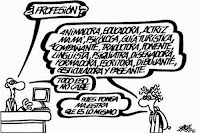Differences
between Blackboard and Maximalist slides. (comment on teaching course
material)
There is a surprising difference between the
percentage of students in favour of the blackboard in the first and second
surveys. The survey doesn’t seem to have
been carried out on the same group of students- different number- and not the
same subject or teacher. While I was
reading the advantages and disadvantages of each device, I was imagining my
students, and the way I explain, and realizing that everything depends very
much on the way the teacher displays the concepts on the blackboard or the
slide; whether the rhythm is suitable for the students; whether practical use
of the concepts is introduced gradually, after each concept or group of
concepts, or after explaining the whole content of a unit, etc. It also depends on the students’ attitude.
I usually introduce “bits of grammar”, which I call
grammar squares- as I tell them to copy them in the notebook, surrounded by a
square- when they have problems to understand or put into practice a
concept. We practise it immediately-
normally I introduce it in the middle of a practice, when they have problems-
and the result is that only a small percentage of them remember that it is in
their notebook.
As for the philosophy "the teacher works, the student
works":
-It seems too obvious that it is the only successful
way:
-Why doesn’t it happen? Nice question: what are the students supposed to do to
succeed in a particular subject? If the
answer is : “pass an exam”, we already have a problem. The goal is the exam, the learning process is
not important for them, so the lesson is not important, only the exam. And when they miss a substantial part of the
process, they are missing a substantial part of the learning. Practice is basic; maybe it is the only
effective way of learning, and we have students who have been mostly taught
that exams are the only compulsory obstacle to be overcome, anything else seems
to be redundant.
Arturo Neira.
Arturo Neira.





















